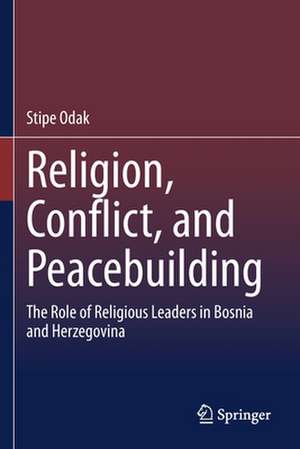Religion, Conflict, and Peacebuilding: The Role of Religious Leaders in Bosnia and Herzegovina
Autor Stipe Odaken Limba Engleză Paperback – 28 oct 2021
The book, furthermore, proposes two correlated concepts – “theological dissonance” and “pastoral optimization” – as theoretical tools to describe the interplay between moral ideals and practical limitations. The text is a valuable resource for religious and social scholars alike, especially those interested in topics of peace, conflict, and justice. From the methodological standpoint, it is an original and audacious attempt at bringing together theological, philosophical, and political narratives on conflicts and peace through the innovative use of the Grounded Theory approach.
| Toate formatele și edițiile | Preț | Express |
|---|---|---|
| Paperback (1) | 537.79 lei 6-8 săpt. | |
| Springer International Publishing – 28 oct 2021 | 537.79 lei 6-8 săpt. | |
| Hardback (1) | 544.34 lei 6-8 săpt. | |
| Springer International Publishing – 28 oct 2020 | 544.34 lei 6-8 săpt. |
Preț: 537.79 lei
Preț vechi: 632.69 lei
-15% Nou
Puncte Express: 807
Preț estimativ în valută:
102.90€ • 107.73$ • 85.15£
102.90€ • 107.73$ • 85.15£
Carte tipărită la comandă
Livrare economică 05-19 aprilie
Preluare comenzi: 021 569.72.76
Specificații
ISBN-13: 9783030551131
ISBN-10: 303055113X
Pagini: 467
Ilustrații: XXXVII, 467 p. 12 illus.
Dimensiuni: 155 x 235 mm
Greutate: 0.7 kg
Ediția:1st ed. 2021
Editura: Springer International Publishing
Colecția Springer
Locul publicării:Cham, Switzerland
ISBN-10: 303055113X
Pagini: 467
Ilustrații: XXXVII, 467 p. 12 illus.
Dimensiuni: 155 x 235 mm
Greutate: 0.7 kg
Ediția:1st ed. 2021
Editura: Springer International Publishing
Colecția Springer
Locul publicării:Cham, Switzerland
Cuprins
Preface: A universe and an origami – Conducting an interdisciplinary work.- Introduction.- Methodology.- Chapter 1. Forgiveness.- Chapter 2. Reconciliation.- Chapter 3. Memory.- Chapter 4. Peacebuilding roles of religious leaders.- Chapter 5. The square of religious influence – an integrative model for understanding religion, conflicts, and peacebuilding.
Notă biografică
Stipe Odak is a post-doctoral researcher at the Institut de sciences politiques Louvain-Europe (Université catholique de Louvain). He obtained his Ph.D. in Political and Social Sciences from the UCLouvain and a doctorate in Theology (S.T.D.) from KU Leuven. Previous to his doctoral studies, he graduated with master’s degrees in Sociology, Comparative Literature, as well as in Theology and Religious Studies from the University of Zagreb (Croatia), and KU Leuven (Belgium).
His main research topics are religion, collective memory of conflicts, and peacebuilding.
He is a laureate of several poetry awards in Croatia and Bosnia and Herzegovina and a member of the Bosnian-Herzegovinian branch of the PEN International writer’s association.
His main research topics are religion, collective memory of conflicts, and peacebuilding.
He is a laureate of several poetry awards in Croatia and Bosnia and Herzegovina and a member of the Bosnian-Herzegovinian branch of the PEN International writer’s association.
Textul de pe ultima copertă
This book provides fresh insights into the role of religious leaders in conflict transformation and peacebuilding. Based on a large dataset of interviews with Christian and Muslim leaders in Bosnia and Herzegovina, it offers a contextually rich analysis of the main post-conflict challenges: forgiveness, reconciliation, and tragic memories. Designed as an inductive, qualitative research, it also develops an integrative theoretical model of religiously-inspired engagement in conflict transformation. The work introduces a number of new concepts which are relevant for both theory and practice of peacebuilding, such as Residue of Forgiveness, Degree Zero of Reconciliation, Ecumene of Compassion, and Phantomic Memories.
The book, furthermore, proposes two correlated concepts – “theological dissonance” and “pastoral optimization” – as theoretical tools to describe the interplay between moral ideals and practical limitations. The text is a valuable resource for religious and social scholars alike, especially those interested in topics of peace, conflict, and justice. From the methodological standpoint, it is an original and audacious attempt at bringing together theological, philosophical, and political narratives on conflicts and peace through the innovative use of the Grounded Theory approach.
The book, furthermore, proposes two correlated concepts – “theological dissonance” and “pastoral optimization” – as theoretical tools to describe the interplay between moral ideals and practical limitations. The text is a valuable resource for religious and social scholars alike, especially those interested in topics of peace, conflict, and justice. From the methodological standpoint, it is an original and audacious attempt at bringing together theological, philosophical, and political narratives on conflicts and peace through the innovative use of the Grounded Theory approach.
Caracteristici
Combines perspectives from the political, social, and religious studies in a truly interdisciplinary fashion Introduces a number of original concepts relevant for both the theory and practice of peacebuilding Offers an integrative model of the conflicts resolution and peacebuilding activities of religious leaders
